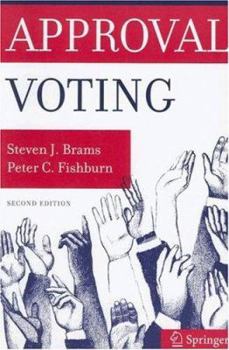Approval Voting
Approval Voting proposes a compelling way to elect some 500,000 officials in public elections. Under this system, voters may vote for, or approve of, as many candidates as they like in multi-candidate elections. Among the many benefits of approval voting are its propensity to elect the majority candidate (rather than the strongest minority candidate, as often occurs under plurality voting), its relative invulnerability to insincere or strategic...
Format:Paperback
Language:English
ISBN:0387498958
ISBN13:9780387498959
Release Date:January 2007
Publisher:Springer
Length:200 Pages
Weight:0.70 lbs.
Dimensions:0.4" x 6.1" x 8.9"
Customer Reviews
3 ratings
Third party candidates ought to embrace this!
Published by Thriftbooks.com User , 17 years ago
Third parties will never come into power without an approval voting system. Unfortunately, they do not understand this simple fact and instead flail away hopelessly instead of pushing for approval voting. Without approval voting, voters for third party candidates are always at risk of being spoilers or throwing their votes away. Approval voting prevents both of these scenarios. Brams shows that there is no perfect voting system, however approval voting is a very simple alternative to America's current system allowing for many nuances in voting. Do not confuse approval voting with more needlessly complicated systems. In approval voting you simply mark on a ballot whether a candidate is acceptable (meets with your approval) or not. A simple binary process allowing for all kinds of voter strategies resulting in the most satisfactory candidate to the plurality of voters. 2 candidates, 2 votes (yes/no for each). 10 candidates, 10 votes. More complicated systems ask that voters rank each candidate in order of preference, etc. Think of all the invalid ballots when 5 candidates are mis-ranked (for example: 0,3,1,7,7 instead of 2,3,1,4,5...) Some organizations have experimented with mixed success with approval voting. Where there is high participation and multiple candidates the system works well, but when there is high voter apathy as I recall the system doesn't have much benefit. Modifications include runoffs, None of the Above, etc.
Some Day This Book Will Be A Classic
Published by Thriftbooks.com User , 21 years ago
I really hope that some day we implement Approval Voting in our country. This book will be a classic, remembered as the first seed of a beautiful political reform.In a nutshell, Approval Voting allows you to rate each candidate as acceptable or unacceptable. The candidate acceptable to the most voters wins.Our current system, one man one vote, works fine with only 2 candidates. However, with 3 or more candidates our current system is faulty. There are plenty of problems with it that you can learn of from the literature on voting, but the most obvious is the "spoiler problem", where a minor candidate (e.g. Buchanan or Nader) can steal support from a major candidate (e.g. Bush or Gore). Approval Voting solves this problem, because you can simply indicate acceptance of Gore as well as Nader, or Buchanan as well as Bush.This book is very balanced in its coverage of topics. They cover plenty of important theory in a very rigorous fashion, but also go through empirical examples from real elections. They develop tools for analyzing election data, in hopes of understanding what WOULD have happened if we had used Approval Voting.Also, the math in the book is kept relatively simple. And, even if you aren't a big math fan, the first chapter is geared toward the non-expert, and in most chapters the first and last sections outline the basic ideas. So, if you want to learn about how Approval Voting stacks up in strategic matters, but you don't want to wade through the math, just read the first and last sections of the chapter on strategy.Overall, this books is fantastic. I strongly recommend it! It's hard to find, but copies are out there for the determined reader, and you won't even have to steal them from the library!Finally, I recommend the paperback version over the hardcover. The paperback has some reviewer comments on the back, which gives a little insight as to how the book was received when it first came out.
Third Party Candidates - The road to Legitimacy
Published by Thriftbooks.com User , 23 years ago
Brams and Fishburn have written an elegant book that brings approval voting alive. While not for the casual reader, anyone with previous game theory knowledge should enjoy this work. Third party candidates are a real part of today's news, as the role of Nader in the 2000 election indicates. I used this book to analyze the 1998 Minnesota Gubernatorial race that saw the election of Jesse Ventura. Anyone attempting to analyze the 2000 election needs to start with this book.




